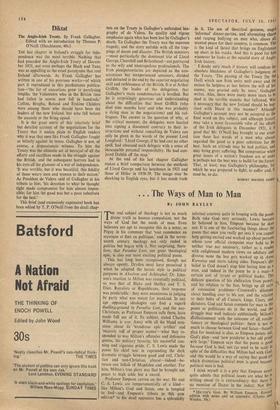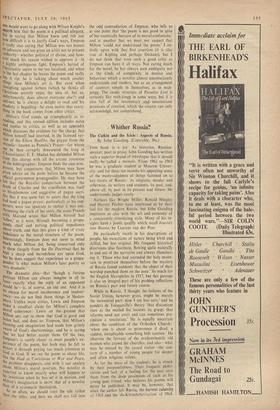. . . The Ways of Man to Man
By JOHN BAYLEY
E real subject of theology is not so much divine truth as human compulsion, not the ways of God but the needs of man. Even believers are apt to recognise this in a sense, as Peguy in his comment that 'tout commence en mystique et finit en politique,' and in the seven- teenth century theology not only ended in politics but began with it. Not surprising, there- fore, that Paradise Lost, our great theological epic, is also our most exciting political poem. This has long been recognised, though not always openly. Dryden must have perceived it when he adapted the heroic style to political purposes in Absalotn and Achitophel. Dr. John- son's reaction to Milton was essentially political, so was that of Blake and Shelley and T. S. Eliot. Royalists or Republicans, their response was predictable: they were unanimous in judging by party what was meant for mankind. In any age opposing ideologies can find a superb duelling-ground in Paradise Lost, and the neo- Christians, as Professor Empson calls them, have made full use of it. Its subject, stated Charles Williams, is war. Away with all the bland non- sense about its 'wondrous epic artifice' and 'majestic roll of proper names'—what they re- sponded to was Milton's offensive and defensive genius, his military ferocity, his masterful cun- ning and vigorous pride. C. S. Lewis made the poem his chief text in expounding the dark dramatic struggle between good and evil, Chris- tian and non-Christian, almost—indeed—be- tween one fellow of Magdalen and another. For him, Milton's true glory was that he brought not peace to high table but a sword.
Professor Empson carries on the war. He and C. S. Lewis are temperamentally of a kind— like Milton's God and Satan, one is tempted to feel—and Empson's tribute in this new edition* to his dead opponent has a splendidly
infernal courtesy quite in keeping with the poem, Both take God very seriously, Lewis because he believed in him, Empson because he does not. It is one of the fascinating things about the poem that once you really get into it you cannot help getting excited and worked up about persons whom your official viewpoint may hold to be neither true nor necessary, rather as a reader with enlightened modern views on adultery and divorce none the less gets worked up in Anna Karenina and starts taking sides. Empson's'dis" belief in God doesn't stop him hating him as a man, and indeed in the poem he is a man-3 certain sort of tyrant or political leader. The delicate question of his abdication from power, and his relation to the Son, brings up all sorts of succession problems—Cromwell's dilemma about handing over to his son, and the relation to their heirs of all Caesars, kings, Czars, and dictators. God and Satan compete for man in the poem as politicians do in the world, and the struggle may well indicate subliminally Milton's disillusionment with the outcome of all revolir tionary or theological politics: there is not so much to choose between God and Satan—Satans plan for mankind is also, as Empson points out, God's plan—and 'new presbyter is but old priest Writ large.' Empson says that the poem is good because God is bad, not (as used to be said) in spite of the difficulties that Milton had with God, and this would be a way of saying that good art which dramatises political man is good because political man is bad.
I think myself it is a pity that Empson never quite admits that political issues are what he is writing about (it is extraordinary that there is no mention of Dante in the index). Not teat
* MILTON'S GOD. By William Empson. Revised' edition with notes and an appendix. (Chatto and Windus, 30s.) • °Ile would want to go along with Wilson Knight's superb hint that the poem is a political allegory, but in saying that Milton knew and felt just how difficult it is to justify God's ways, Empson h really also saying that Milton was too honest an advocate and too great an artist not to present authority--whether political or divine, and how- ever much his reason wished to approve it—in highly ambiguous light. Empson's hatred of Christianity seems to me too localised, and when in the last chapter he leaves the poem and really lets it rip, he is talking about much smaller things than Milton's art is. But even' when inveighing against torture (which he thinks all Christians secretly enjoy the idea of, but so, unfortunately, does almost everyone else?) and anti-sex, he is always a delight to read and his Modesty is beguiling—he even insists that every- thing in the book comes from other critics.
Milton's God stands up triumphantly to re- reading, and this revised edition includes notes and replies to critics, as well as an appendix which discusSes the evidence for the charge that Milton himself had inserted, in the licensed ver- sion of the Eikon Basilike, the prayer from the Arcadia—known as Pamela's Prayer—for whose 11,se he then savagely denounced the king in tikonokla.vtes.' F. F. Madan has defended Milton fr,°tn this charge with all the arcane resources °I. the bibliographer; Empson finds the case non- ProVen, but conjectures that Milton may have given advice on the point before he became the official government propagandist. He may have felt that the Royalist comparison between the death of Charles and the crucifixion was itself so blasphemous and suggestive, of pagan sacri- 11,ee that it was quite fair to assert that the king had used a pagan prayer, particularly as his sup- Porters were too ignorant to realise it was one. Assuming the truth of the story, the acute French critic Morand wrote that Milton himself had fallen,' as it were, through becoming a propa- ganda chief and putting political expedience above truth, and that this gives a kind of crazy IMbalance to the moral structure of the poem. Interestingly, Empson does not seem to mind much what Milton did, being concerned only to show (largely from the De Doctrina) that he but a sharp and incredulous eye upon God, nnt he does suggest that experience as a propa- gandist 'is what makes Milton's later poetry so Very dramatic.'
The dramatic plea—that 'though a furious Partisan Milton can always imagine in all its 6 force exactly' what the reply of an opponent Would be'—is, of course, an old one. And it is no excuse for moral incoherence and inadver- teneY--we• do not find those things in Shakes- peare. Unlike most critics, Lewis and Empson Make a steadfast claim for Milton's complete moral coherence: Lewis on the • ground that Milton sets out to show that God is good and Satan atan bad, and does so; Empson, that Milton's learning and imagination had made him grimly aware of God's shortcomings, and he is saying Itat we had better accept them. Of the two, Empson's is surely closer to most people's ex- perience of the poem, but both may be felt to distort it through paying too much attention to like as God. If we see the poem as about life, like the Iliad or Coriolanus or War and Peace, the Problem disappears, and with it our anxiety about Milton's moral position. No novelist is his to know exactly what will happen to fits invention when he has set it in motion, and than Milton's imagination is more that of a novelist n of a systematic theologian. As so often, we should trust the tale rather than the teller, and then we shall not fall into the odd contradiction, of Empson, who tells us at one point that 'the poem is not good in spite of but essentially because of its moral confusions,' and at another that we must, not suspect that Milton 'could not understand the poem.' I en- tirely agree with that first assertion (it is also true of Kipling and perhaps Dickens), but I do not think that even such a .good critic as Empson can have it all ways. Not caring much for the novel, he has always seen ambiguity not as the kinds of complexity in motive and behaviour which a novelist almost unconsciously understands and renders, but as an arrangement of counters simple in themselves, as in mah- jongg. The exotic structure of Paradise Lost is certainly like mah-jongg in some ways, but it is also full of the involuntary and. unconscious processes of creation, which the creator can only acknowledge', not comprehend.





























 Previous page
Previous page